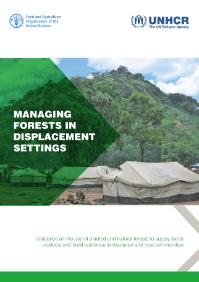Focal point
Location
The Food and Agriculture Organization of the United Nations leads international efforts to defeat hunger. Serving both developed and developing countries, FAO acts as a neutral forum where all nations meet as equals to negotiate agreements and debate policy. FAO is also a source of knowledge and information. We help developing countries and countries in transition modernize and improve agriculture, forestry and fisheries practices and ensure good nutrition for all. Since our founding in 1945, we have focused special attention on developing rural areas, home to 70 percent of the world's poor and hungry people.
Members:
Resources
Displaying 421 - 425 of 5074Managing forests in displacement settings
The massive increase in demand for woodfuel for cooking caused by sudden influxes of refugees and other displaced people is usually the main driver of forest degradation and deforestation in displacement settings. It places enormous pressure on nearby forests and woodlands and is often a source of tension between the host and displaced communities. A lack of sufficient cooking fuel also has an impact on the nutrition and health of vulnerable people in such settings.
Manual de Campo Inventario Forestal Nacional de Colombia
The manual provides information on the procedures followed by field brigades for the establishment of conglomerates and permanent plots of the National Forest Inventory (IFN). It also provides information about the planning and execution of each of the phases contemplated by the operation, describes the methods, techniques and instruments used in the data collection, and details the process of filling out the formats created by IDEAM to record the data and field information.
Profil de Pays – Niger
Ce profil de pays décrit l’état des ressources en eau et l’utilisation de l’eau, ainsi que l’état de la gestion de l’eau agricole dans le Niger. L’objectif de cette monographie est de décrire les particularités du pays et les problèmes rencontrés dans le développement des ressources en eau et de l’irrigation en particulier.
Technical Cooperation Project – Support to countries to address illegal, unreported and unregulated fishing (IUU). Thirty-fifth session of the Asia-Pacific Fishery Commission (APFIC)
Meeting Name: Asia-Pacific Fishery Commission (APFIC)
Meeting symbol/code: APFIC/18/INF-10
Turkey and FAO
The partnership between FAO and Turkey has thrived since the establishment of the country office in 1982 and the Subregional
Office for Central Asia in 2007 in Ankara. Through the FAO-Turkey Partnership Programme and FAO-Turkey Forestry Programme,cooperation continues to prosper. The country has benefited from wide-ranging assistance from FAO and it is also an activeresource partner, providing indispensable technical and financial support to FAO activities, particularly within the subregion.










